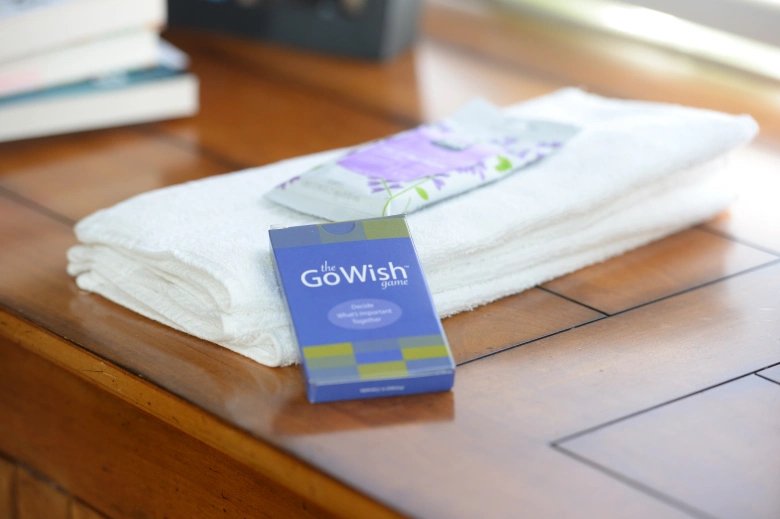Mill Valley end-of-life doula helps people
navigate death and grief
By Colleen Bidwill | cbidwill@marinij.com | Marin Independent Journal, 2/26/22
Photo credit: Sherry LaVars/Marin Independent Journal
Mill Valley resident Karen Murray helps others through her end-of-life work.
Photo credit: Sherry LaVars/Marin Independent Journal
Among the items included in end-of-life doula Karen Murray's toolbox are Go Wish cards, a towel and soap.
Photo credit: Sherry LaVars/Marin Independent Journal
A stack of books that reflect on grief, death and caregiving.
Photo credit: Sherry LaVars/Marin Independent Journal
Karen Murray stands by photos of family members who inspired her to become an end-of-life doula.
We’ve all lost something during COVID. Maybe it’s loved ones, a job, the lack of stability, the weddings, graduations and funerals we couldn’t attend or that never happened at all, the people we haven’t been able to see or even a sense of “normalcy” itself. Mill Valley’s Karen Murray wants to talk about it. As an end-of-life doula, she works to break the taboo behind grief, dying and loss.
Murray got into end-of-life work in 2017 after joining the Marin Threshold Choir, a volunteer group founded by West Marin resident Kate Munger that sings by the bedsides of terminally ill and dying patients. She then became a Sutter Health hospice volunteer and an end-of-life doula, offering bedside singing and poetry, Reiki therapy, advance planning and more through her business, Compassionate Walk End of Life Doula Services.
She and fellow Mill Valley end-of-life doula Anthea Grimason will discuss “Grief of Mind and Body,” the first of their “Let’s Talk About Grief” series, online at 6:30 p.m. March 3, as well as mindfulness practices and breath work. To register, go to Eventbrite.
Q What made you go into end-of-life work?
A My mother-in-law’s cancer diagnosis prompted us to move back across the country. It was the first death that I saw from start to finish. The fact that we all could be around her as a family for months and it was sort of a celebration at the end of her life really made an impression on me. And in later years, as other members of my family started down that path, my family handled things in much the same way. We were around and working together. By the time it came to my grandfather in 2017, I felt much more at ease with the situation and took a lot more ownership of what needed to happen and felt a real comfort around that. I would play music and sing at the bedside of my family members who were dying. Hospice and nursing staff kept saying, “Your family is really unique, it’s not what everybody gets.” Other people were dying alone, didn’t have visitors or family weren’t taking shifts and loving on them like we thought was important. I started wondering how I could do this with other people’s families and bring this kind of comfortable and natural feeling around death.
Q How’d you find out about end-of-life doula work?
A We were in a rehearsal one night for the Marin Threshold Choir and a woman came from Final Passages, a nonprofit that trains end-of-life-doulas and teaches home [funerals] and green burials. When she spoke to us about the work she does, my head exploded. It was exactly what I felt was a fit for me.
Q What do you enjoy about your work?
A After years of teaching music as an elementary school teacher and homeschooling my kids, I’d always joked, “I wonder what I am going to be when I grow up?” My kids were like, “You are a grownup.” I felt like there was something out there for me. This felt like the perfect intersection of all those helping, intuitive skills and inclinations I had with the feelings that death is such a sacred time and we as a society have done a lot to mess with it.
Q Your work must be emotional at some times. How do you deal with that?
A It can be really emotionally draining, but it can also be very exciting and joyful. I think every single doula has some sort of spiritual practice, and for me, that is huge. It has changed me as a person as I got serious about meditation. It gives me the skills to be objective, go into a place of mindfulness, have a reservoir of calm that I can reach out to when things are getting frantic or people are getting worried and upset that allows me to stay sensitive to it but separate from it at the same time, so that I can be what they need me to be.
Q How do you want people to approach topics like dying?
A Talk about it. Make it a common conversation. It doesn’t have to be heavy or morbid. Anyone 18 and older should have their end-of-life paperwork in order, advance directives, have people who know what your wishes are. It just needs to be a normal thing; it’s another thing that happens to all of us.



